Intermittent fasting has many health benefits, but some may ask difficult questions like “Does chewing gum break a fast?”, especially at the start of their journey. Join us to discover what’s allowed during your fast and whether gum is a good sidekick.
Moreover, can you chew gum during Ramadan or any other fasting days? Ensure your food choices are on point and your blood work is clear.
Does chewing gum break a fast?
Fasting is when you go without eating or drinking anything with calories for a set period (1). Can you have gum while fasting? If you’re looking for a quick answer—gum, with some calories, may disrupt your fasting efforts.
Can you have chewing gum while intermittent fasting?
Intermittent fasting (IF) is a popular eating pattern involving alternating between fasting and feasting periods, offering various protocols to accommodate different lifestyles, despite the inherent challenges of fasting adherence (1).
Some fast for a few hours daily, while others go all-in with 24 to 48-hour fasts. Some common types of IF are (1, 2, 3):
- Time-restricted feeding: You consume calories over an eating window of 3–12 hours daily.
- Fast for a day (such as alternate day fasting, 5:2 diet, or weekly one-day fasting): The fasting days involve a very low-calorie diet (20–25% of your calorie needs).
- Fasting-mimicking diet: Restrict yourself to 0.75‒1.1 kcal calories for five consecutive days a month.
The eating schedule can effortlessly align with our body clock, potentially boosting our metabolism (4, 5). Can I chew gum during intermittent fasting? The answer depends on the type of IF you’re into and your goals.
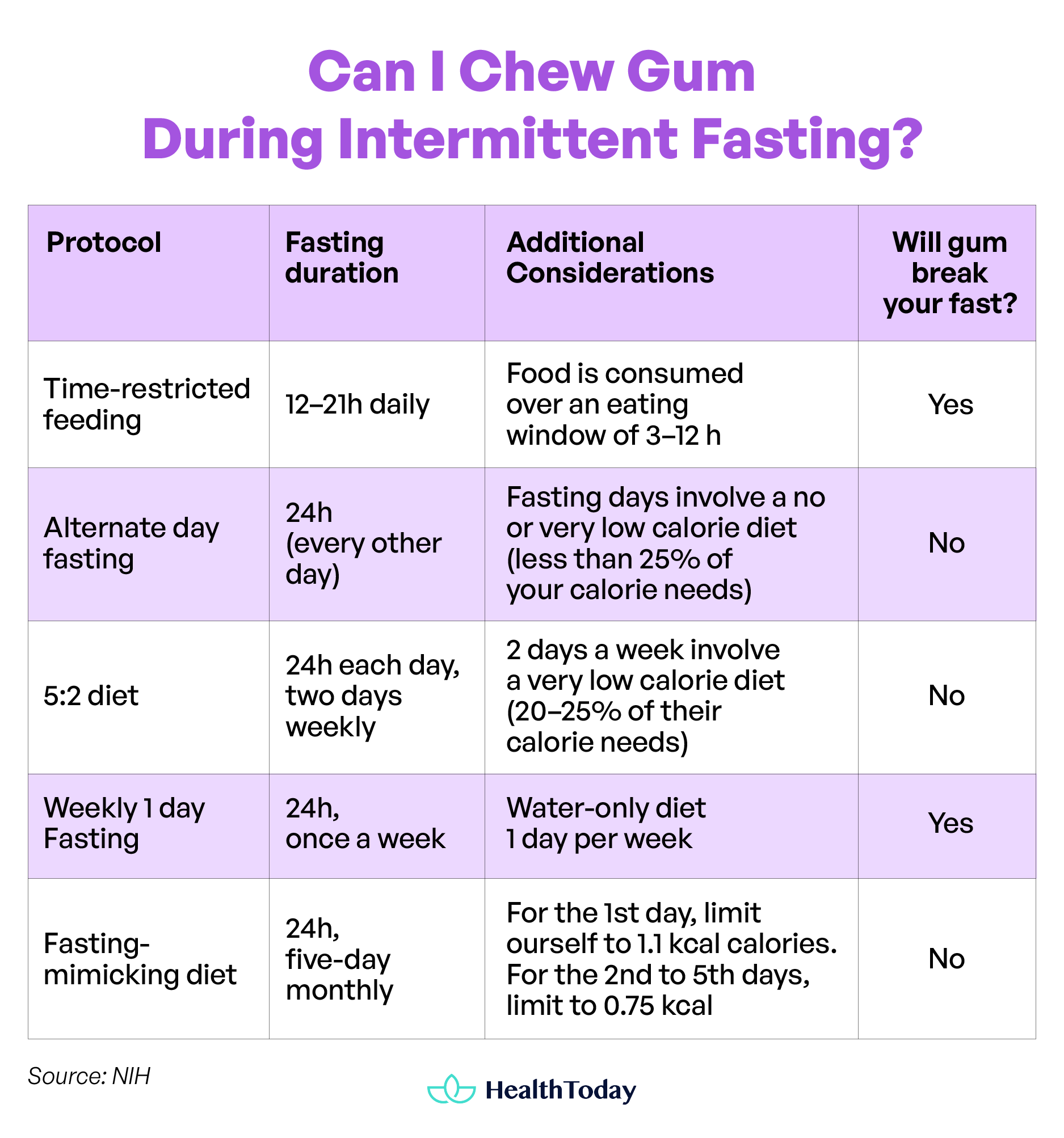
Technically, any macronutrient may affect your fasting plan. One stick of chewing gum weighing 3 grams (with 80% sugar) provides (6):
- Energy: 10.8 kcal
- Fat: 0 g
- Protein: 0 g
- Carbohydrates: 3 g
- Sugar: 1.98 g
With 10.8 calories, chewing gum might be possible in some whole-day IF diets like the 5:2 diet, in which you can eat up to 25% of your daily calories (1, 6).
But for other diets, the answer to the question of “Does gum break a fast ?” is “Yes.”
Why do people often try intermittent fasting? The top reason is usually to lose weight and enhance insulin sensitivity. Therefore, it helps combat diabetes and obesity. How does it work? When your insulin level is soaring, your body stores fat, but when it’s low, it burns fat easily (1, 7).
The fat-loss effect results from the ketosis theory. Your body turns the carbs (in foods) into glucose for fuel. But when you fast, insulin can’t be produced, and your body starts using fat to produce ketones (after using glucose storage) for energy, which helps burn belly fat (1, 7).
Any carbs can raise your blood sugar (glucose) level, triggering an insulin spike (7). So, chewing gum may accidentally disrupt the fat-burning process and thrust your body back into a fat-storing mode, even though we are yet to know the calorie or carbs threshold that turns ketosis on or off (7).
Can you chew sugar-free gum while intermittent fasting?
Sugar-free chewing gum contains sugar alcohols (50‒60%) and artificial sweeteners (up to 3%), which make them sweet without sugar. Common sugar alcohols (polyols) include sorbitol, mannitol, xylitol, maltitol, lactitol, and isomalt (8, 9).
Will sugar-free gum break a fast? The answer isn’t straightforward, as gum’s sweetener contents can raise blood insulin levels even less rapidly than regular sugar (9, 10).
Even though it’s sugar-free, that gum might still pack around 5–9 calories with some grams of carbs (9, 10). Sugar alcohols don’t make your blood sugar or insulin shoot up as fast as regular sugar (indicated by a lower glycemic and insulin index), but they’re not a zero on the scale (11).
Moreover, artificial sweeteners, like aspartame and sucralose, can provoke insulin responses without increasing your blood sugar (12, 13). They, thus, increase your risk of obesity and type 2 diabetes when consumed regularly (14, 15).
Also, other additives like glycerin, preservatives, and flavors may add in a few extra calories (8, 9).
Some may think that the sugar effect of gum is not significant. But remember, if you go overboard with the gum, the sugar and calories will add up quickly.
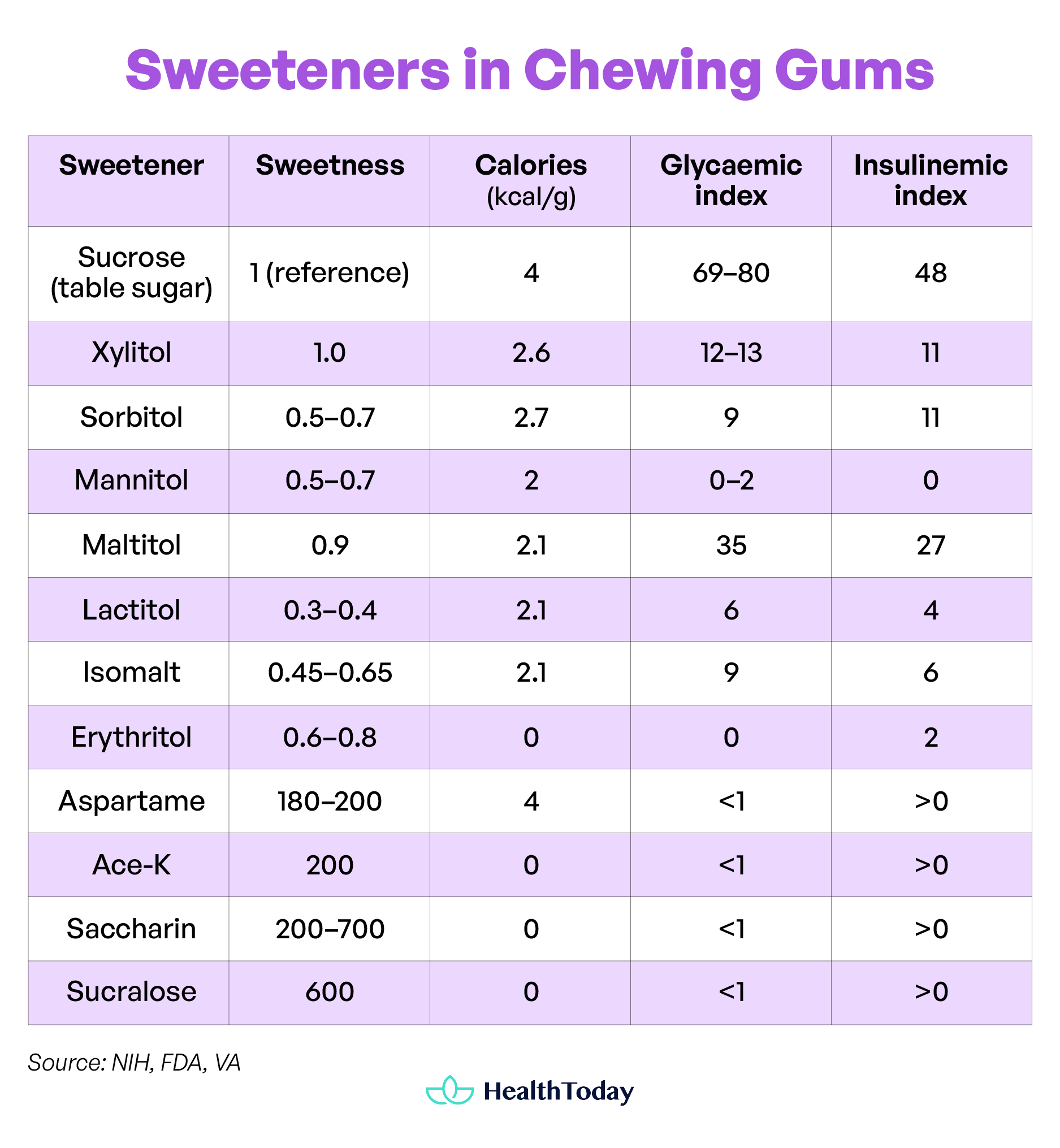
Best gum for fasting
If you prefer chewing gum during a fast, opt for a sugar-free variety containing xylitol or sorbitol, as mouth bacteria cannot convert these polyols into harmful acids(16).
Sugar-free gum can also reduce the risk of cavities by increasing saliva production, thus supporting the natural healing of your tooth enamel (16, 17). Although some may worry that saliva makes you more hungry, studies don’t show conclusive results (18, 19).
If you have irritable bowel syndrome (IBS), those polyols (sugar alcohols) are not for you. They’re part of the short-chain carbohydrates— Fermentable oligosaccharides, disaccharides, monosaccharides, and polyols (FODMAP) and can stir up some digestive problems like diarrhea (20, 21).
If you’re resistant to FODMAPs, look for gum with low-calorie sweeteners like stevia, sucralose, Ace-K, and aspartame (9, 17).
However, you should double-check the ingredients list to ensure no ingredient you are intolerant to or consult a dentist or dietitian to suggest the perfect gum.
Can you chew gum during Ramadan?
Islamic Ramadan is a sacred month-long fast practiced by millions worldwide. Adherents must abstain from foods (including gum), fluids, medications, and smoking during daylight hours (from sunrise to sunset). The daily duration of this fast can be anywhere from 13‒18 hours per day (22). Chewing gum is also considered breaking a fast in Yom-Kippur (Judaism) and Proşadhopavāsa (Jainism) fasting practices (23).
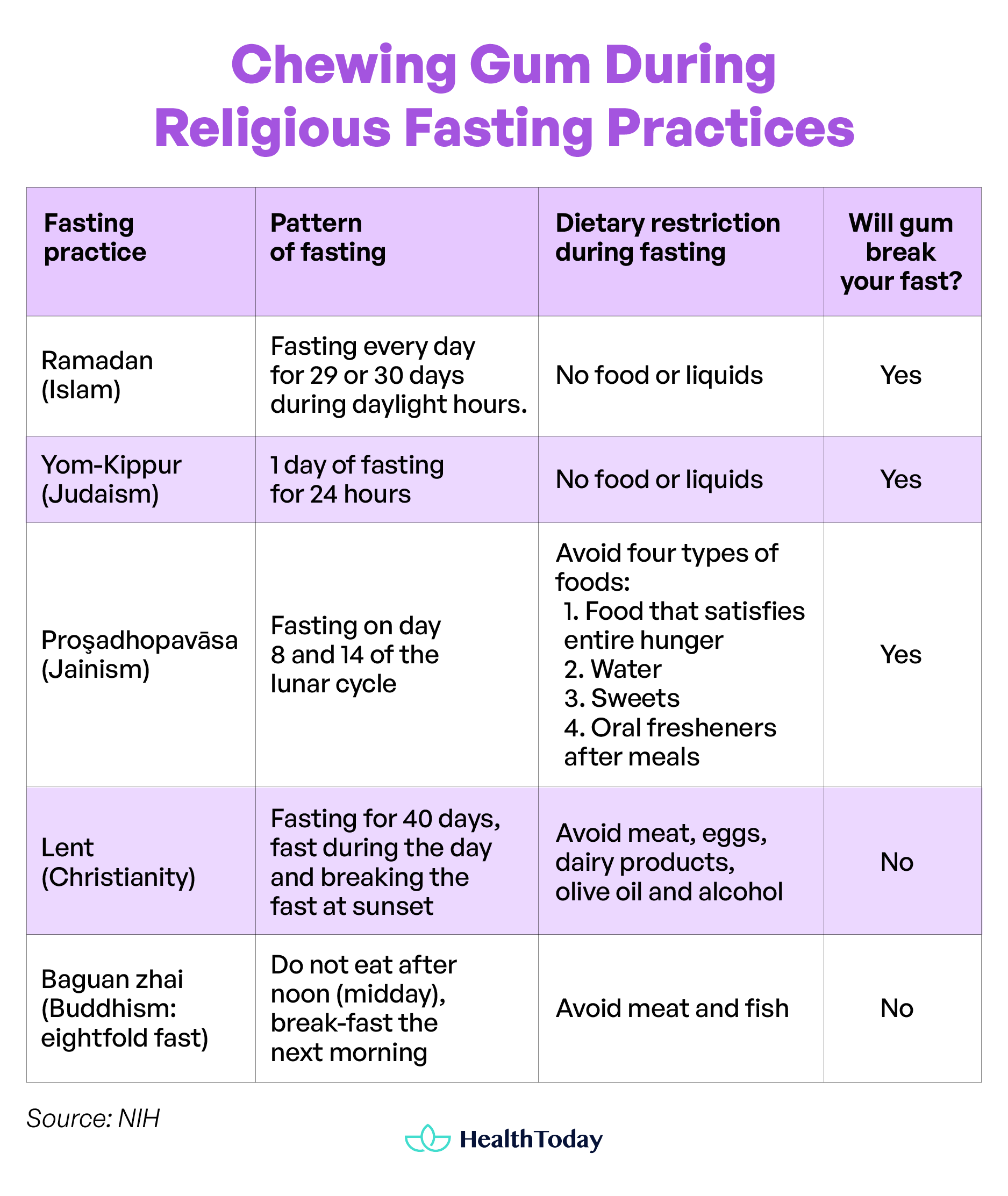
To get optimal intermittent fasting benefits, you need to be strict about it—No food is allowed, and gum is not an exception. Sugar and sweeteners in gum can impact your insulin levels and fasting goals. However, some fasting routines might allow some calories during your fasting hours.
Can you chew gum while fasting for blood work?
To ensure the accuracy of the blood test, you may need to fast beforehand (24).
If your doctor has told you to fast, it means no eating or drinking (except water) for 8‒12 hours before the test. While fasting, you must avoid chewing gum, even sugar-free ones (24).
Chewing gum can stimulate your digestive system, which leads to a misleading sensation of fullness in the stomach and influences your test result (25, 26).
Gum often contains artificial sweeteners, preservatives, colorings, and flavors. If you eat gum or any food before the test, you need to inform your doctor as they might ask you to reschedule to fast properly (24).
Another medical-related fasting method is water-only fasting for therapeutic purposes (just when your doctor suggests). This strict eating pattern means no food—just water, with or without minerals—for several days (27, 28).
Can I chew gum while water-only fasting? For this fasting, you can’t chew gum. Some may be concerned about the safety of a water-only fast. However, the majority of adverse effects were mild to moderate. Severe side effects happen in rare cases (28).
Fasting before a blood test means abstaining from drinks (except water) and foods, including gum. It may kickstart your digestion with hidden calories, impacting your test results. If your doctor suggests therapeutic water-only fasting, gum is also not allowed.
Things allowed during intermittent fasting
It’s best to talk to a licensed medical professional before starting intermittent fasting, as it may not be suitable for everyone (29). This eating pattern may have downsides, requiring more high-quality studies to confirm this (2).
If you need to consume something while fasting, reach for a drink. It keeps your mouth occupied and hydrated—a double win for a successful fast (30).
Water
During fasting, most people only drink water, a safe choice with no calories. Mineral water and regular sparkling (seltzer) water are also good options for fasting (1).
When buying flavored or infused water products, it’s important to check the labels for added sugar or fruit juice.
Tea and coffee
Unsweetened tea doesn’t have calories (31). Besides, a study suggests that green tea can make you feel less hungry (32).
Black coffee contains 0‒3 calories per cup (33). You can drink low-calorie drinks as long as you can keep staying hydrated.
Moreover, studies have shown that caffeine can be a hunger-buster and fat-burner. A single 100mg dose of caffeine can increase the calories you burn while resting by 3‒4% over 2.5 hours (34, 35).
Medications
Medication won’t break your fast, including pre-blood test fasting. You should continue to take medications prescribed by your doctor, but ensure it’s safe on an empty stomach (24).
Medicated gum introduces a novel approach to delivering drugs, enabling a controlled and sustained release of medication within the body (8).
Before you start fasting, talk with your doctor. They can tell you if fasting will disrupt your medications. Fasting can be dangerous if you have certain health conditions.
Will 1 calorie ruin a fast?
Yes. If you’re on a strict fasting pattern, calories are the enemy, whether 1 or 100 calories (23).
Does 5-calorie gum break a fast?
In the strictest sense, consuming just one calorie could end your fast. However, some full-day fasts may let you eat up to 25% of your daily calories (1).
How many calories break a fast?
To know if something will break your fast, look at your body’s insulin response instead of the calorie math. Insulin typically inhibits the burning of fat for energy. During fasting or low-carb states, when insulin levels are low, your body is more likely to use stored fat for energy (7, 36). If your insulin levels spike, you will no longer be in a fasted state, even if you consume a few calories.
Does lemon in water break a fast?
The impact varies based on the quantity. A subtle squeeze or a slice of lemon can enhance your water without increasing calorie intake. Remember that juice extracted from a lemon (about 48 grams) contributes 10 calories and 3 grams of carbs (37).
Does brushing your teeth break a fast?
Toothpaste and mouthwashes contain sugar, such as xylitol. When you fast, you can brush your teeth but not swallow the toothpaste (38).
Summary
Does chewing gum break a fast? Different fasting methods have different rules, but a gum stick, even a sugarless one, can break your fast.
During intermittent fasting, sugar and sweeteners in gum can affect your blood insulin and glucose levels.
Instead of chewing gum, opt for calorie-free sips like water, tea, or coffee. These companions will keep you hydrated and energized without increasing your blood sugar level.







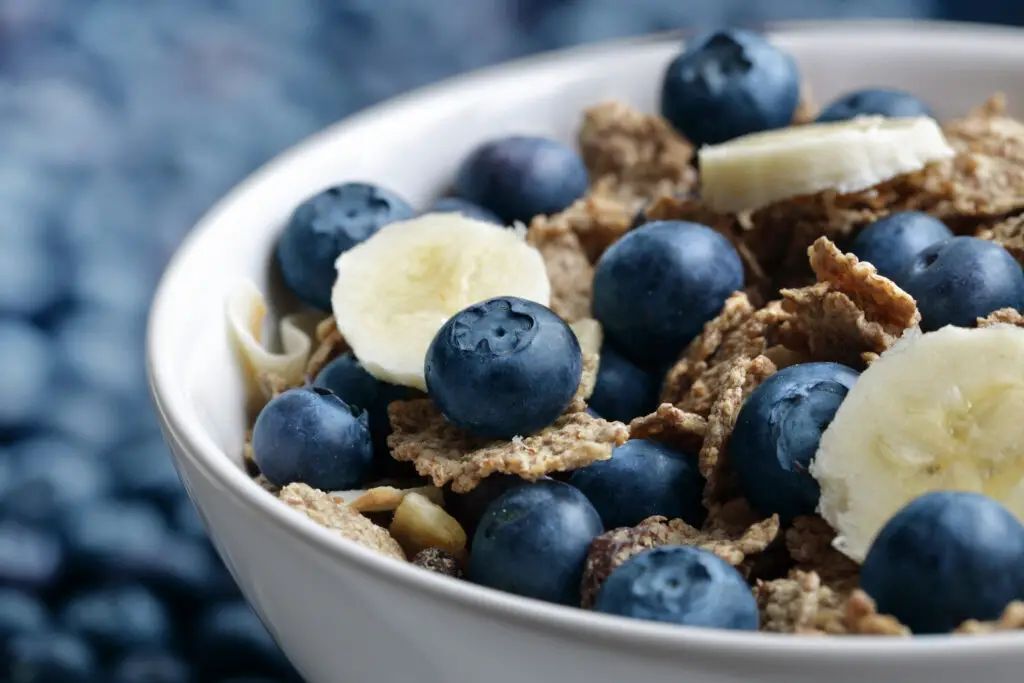


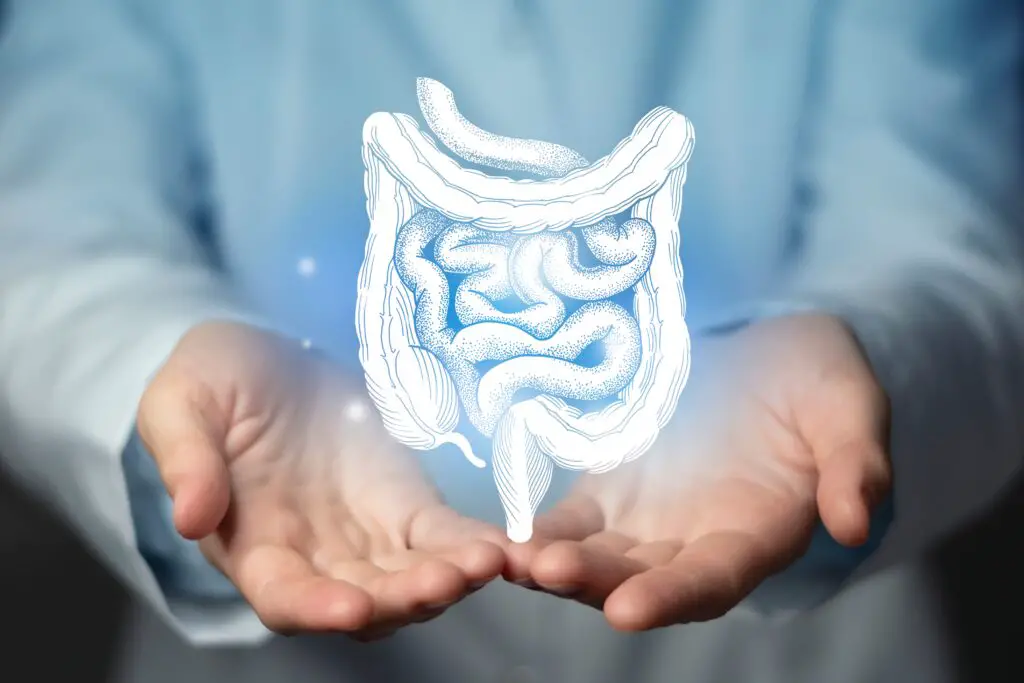
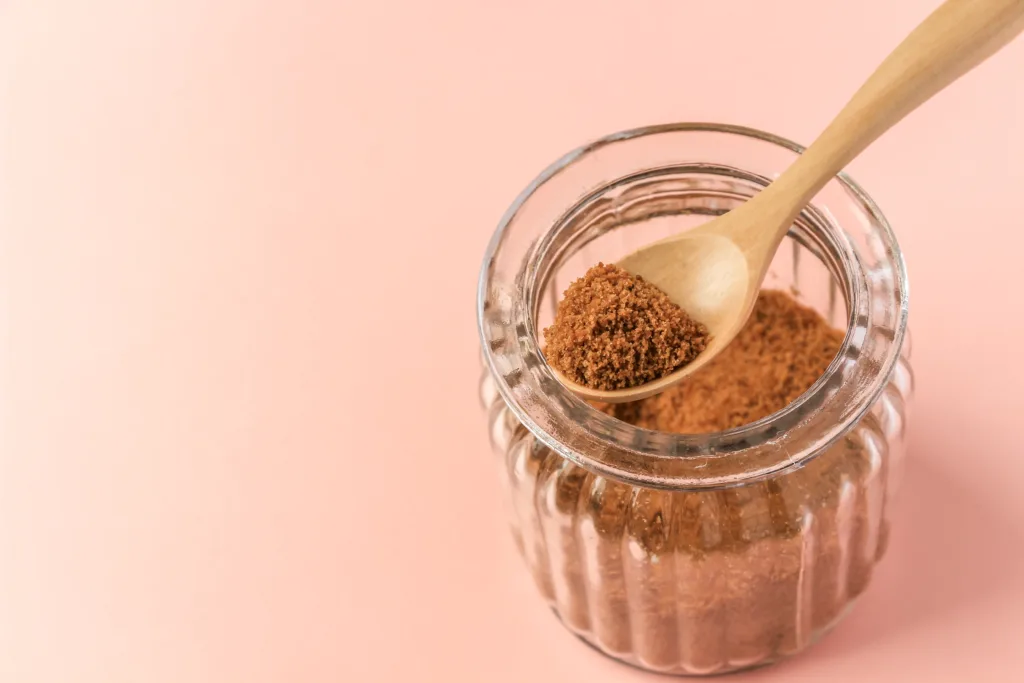
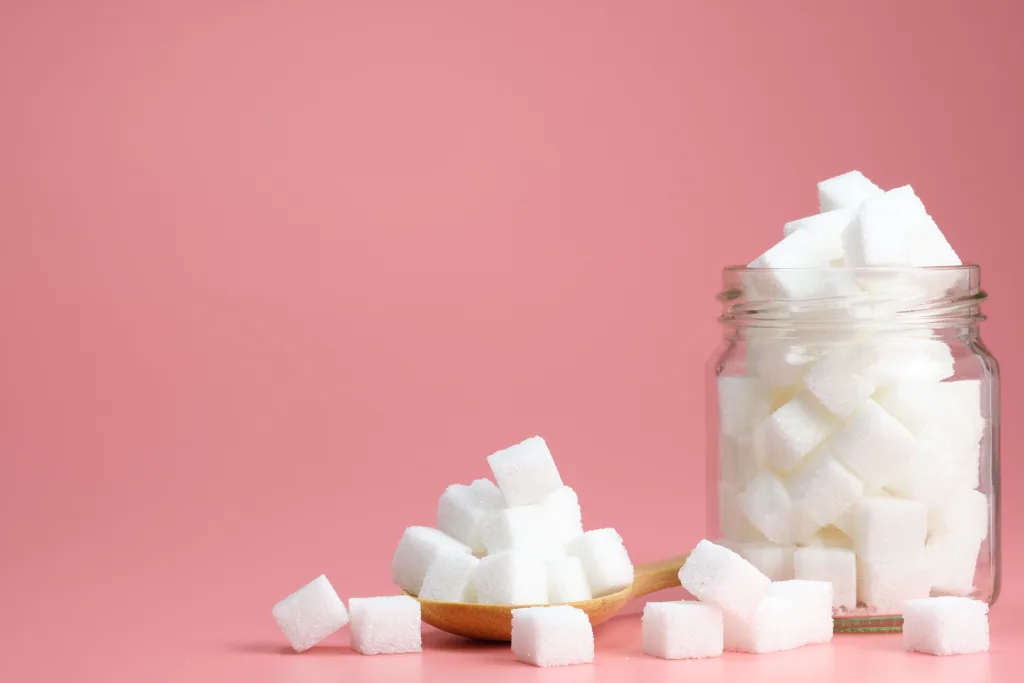

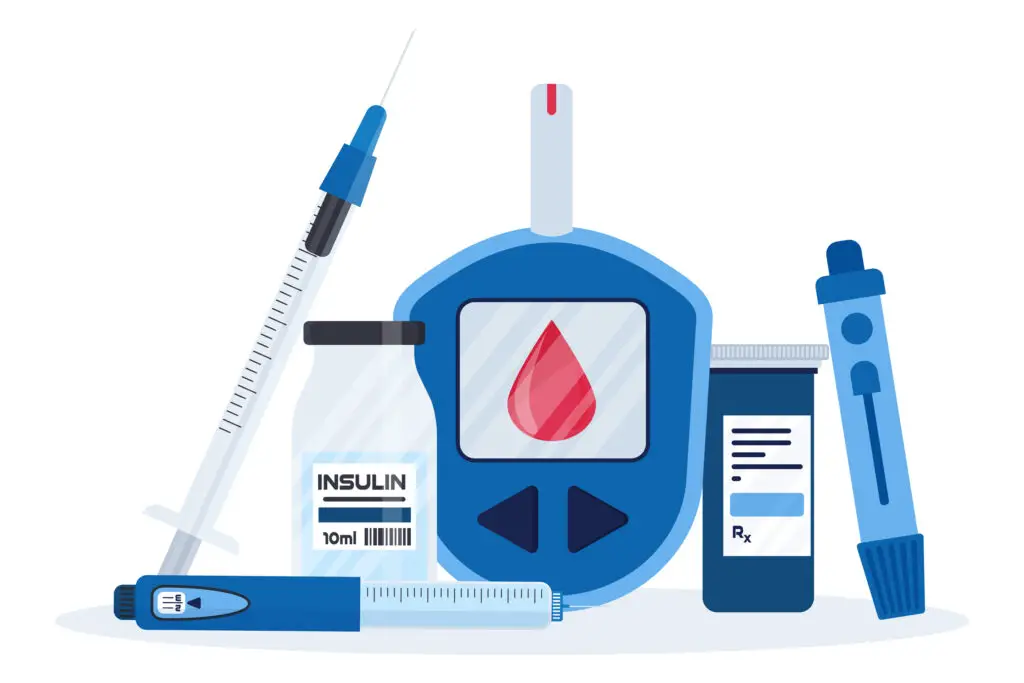


Comments
0